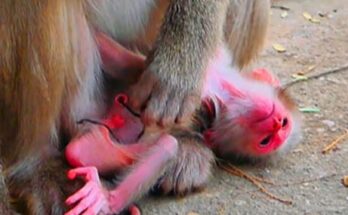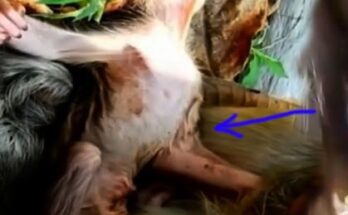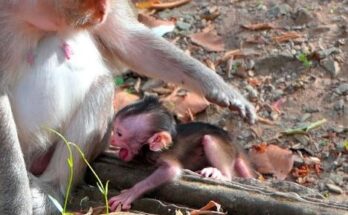In the heart of the animal kingdom, few bonds are as profound as that between a mother and her offspring. For baby monkeys, this connection is not only emotional but also essential for survival. A mother provides warmth, nourishment, protection, and the critical social and survival skills that young primates need to navigate their complex world. However, in some unfortunate circumstances—whether due to human intervention, environmental disruptions, or natural causes—baby monkeys find themselves separated from their mothers. The journey of these young primates as they struggle to survive, adapt, and eventually thrive is both heartbreaking and inspiring.
Separation from their mothers is an immense challenge for infant monkeys. They are born highly dependent, relying on their mothers for milk, comfort, and safety. In the wild, a mother is also the baby’s guide, teaching them how to find food, interact with their social group, and recognize danger. When a baby monkey is orphaned or abandoned, its chances of survival diminish drastically. Many do not make it past the first few weeks, especially if they are too young to eat solid food or lack the instinct to seek protection from predators.
However, nature often has a way of fostering resilience, and many orphaned monkeys find a way to adapt. Some baby monkeys are lucky enough to be taken in by other females in the group—grandmothers, aunts, or even unrelated adults who display strong maternal instincts. These surrogate caregivers can help the baby survive by offering protection and, in some cases, even allowing them to nurse. This phenomenon has been observed in various primate species, highlighting the deep social bonds and empathy that exist within monkey communities.
In cases where the baby monkey is left completely alone, survival depends on its ability to learn quickly. Without a mother’s guidance, these young primates often rely on observation, mimicking the behaviors of older juveniles and adults. They watch how others forage for food, how they groom to maintain social connections, and how they respond to threats. Though they may struggle initially, many of these orphans develop the skills necessary to integrate into their group over time.
In captivity or rescue centers, human caregivers play a crucial role in helping orphaned baby monkeys survive. These facilities provide them with specialized milk formulas, warmth, and the constant companionship they would typically receive from their mothers. Caregivers also introduce them to other monkeys to ensure they develop social skills necessary for their well-being. The goal is often to reintegrate these young primates into the wild once they are strong enough to fend for themselves.
The story of separated baby monkeys is one of both tragedy and hope. While the loss of a mother can be devastating, these young primates often display incredible resilience. Whether through the kindness of adoptive monkey families, their own adaptability, or the intervention of humans, many manage to survive and thrive despite the odds. Their journey is a testament to the strength of nature and the profound power of social bonds, even in the face of heartbreaking loss.


